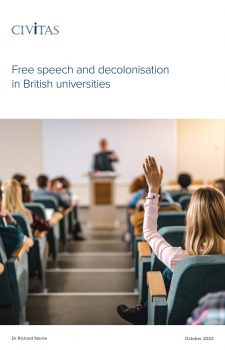Free speech and decolonisation in British universities
Dr Richard Norrie, October 2022
Attacks on free speech seem to be worsening, with recent examples including the attempted assassination of Sir Salman Rushdie and the Batley teacher forced into hiding by Islamist extremists. In our universities that are supposed to be bastions of free inquiry, we are seeing staff under pressure to conform to transgender ideology and in some cases, driven out of their jobs for expressing their scepticism, such as the case of Kathleen Stock at the University of Sussex.
The decolonisation movement is more pronounced in British universities than previously thought. In some form, either through official statements or academic advocates, it is present in seven out of 10 universities.
In addition to this, we are seeing the spread of a phenomenon known as ‘decolonisation’. This is something that has no concrete definition and seeks to rewrite academic curricula as well as reorder the university as an institution, in the name of making them more ‘inclusive’. Is this a threat to academic freedom? The answer is ‘yes’, if it entails pressure on academics by radical activists to conform, overriding their independence in setting their reading lists and writing their lectures.
This briefing assesses the extent to which decolonisation is present in British universities. It finds it to be far more entrenched than previously thought, with 70 per cent of universities having either a formal commitment to decolonisation, or academics advocating for it from within.
The threats to free speech, the controversies and the new radicalism of transgenderism and decolonisation tend to be associated with elite universities. But so too do free speech societies, implying that, at the very least, there will be resistance to authoritarianism.
This new Civitas work concludes with a summary of students’ views on free speech, arguing there are a growing number of students who prefer cossetting to free inquiry. Top universities are both more ‘woke’ and more libertarian.
The relationship will likely not be causal since such things will impact on few students for too little of their time. But this pattern is consistent with a general one of failure in the day job and grand political gestures pertaining to ‘social justice’ to compensate, apparent across many of our institutions.
Download PDF Buy from Civitas
